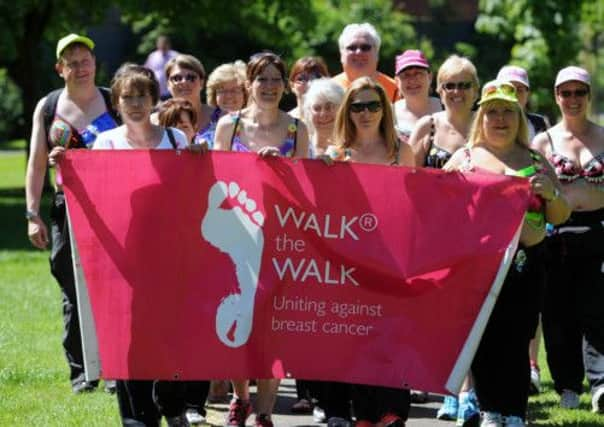Hopes for new breast cancer test


The researchers in Edinburgh believe the test will allow them to personalise treatment by identifying those women who will respond to drugs so the best combination of surgery, chemotherapy, radiotherapy and hormone therapies can be chosen to boost patients’ chances of survival. .
Women in Scotland could be benefiting from this approach in as little as two years, following further research to confirm the results. The pioneering work will be outlined this week at a Breakthrough Breast Cancer charity reception to be hosted by Prince Charles.
Advertisement
Hide AdAdvertisement
Hide AdBreakthrough is raising £425,000 to fund a team led by Professor Mike Dixon, a leading breast cancer surgeon based at the Western General in Edinburgh, to develop the test.
Around 4,500 women a year in Scotland are diagnosed with breast cancer. While better treatments have resulted in survival rates improving in recent years, more than 1,000 women die each year with the disease.
One problem is that four out of ten women with the most common form of breast cancer become resistant to hormone treatments such as Tamoxifen.
But Dixon said there were no tests currently available to predict which women would benefit. The test he has developed, along with researchers Arran Turnbull and Andy Sims, looks for key signals in a tumour which could identify how the cancer will respond to different treatments.
Using information gathered from looking at the biological make-up of tumours from previous patients, the researchers have found “biomarkers” – such as different proteins within the tissue – which differ between women depending on the type and severity of cancer they have.
The tumour would be tested when a patient is diagnosed and then shortly after treatment starts to see how it is responding to the therapies being used. If a particular biological pattern is linked to women becoming resistant to treatment, this can be flagged up at an early stage and the treatment plan adapted accordingly.
Dixon said: “Very early on in a cancer’s life we have learned what it is about that cancer which means that it is not going to do well and we have looked at whether we can get a test to indicate that. We are now in a position where it looks as though we may have a test.
“What Breakthrough are now funding is the rest of the testing to make sure we have a robust test. Of all the things we have done this is probably the most exciting, but it needs now very careful checking.”
Advertisement
Hide AdAdvertisement
Hide AdThe researchers hope to detail their results at a major breast cancer conference in the US later this year.
Dixon added: “We’re currently trying to make the test slightly easier to do so we can do it on any bit of tissue and after that we will be looking to use this in clinical practice.
“We would hope in a year or two we would start using it in Edinburgh and in the longer term get that test out to others.”
Dixon said more than two-thirds of women with breast cancer were now surviving 20 years or longer, but as doctors they wanted to continue to make improvements to help those for whom treatment did not go so well.
“As a patient what you want to know is how is my cancer going to respond to that drug,” he said. “It is an individualistic approach, so we get information about your cancer and how it responds.”
This weekend also saw thousands of women take to the streets of Edinburgh for the annual MoonWalk, organised by charity Walk The Walk, to raise money to help care for cancer patients.